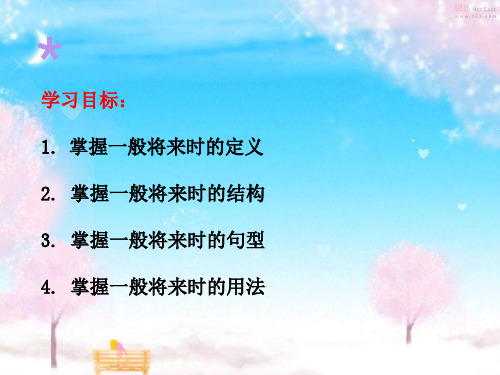一般将来时说课讲解
一般将来时PPT讲稿

04
注意:在一般将来时的句式 变化中,助动词“will”和 “be going to”是最常用的 表达方式。同时,根据不同 的语境和表达需要,可以选 择使用不同的句式结构。
一般将来时的常见错
05
误及纠正
时态误用
01
02
03
错误示例
He will going to the park tomorrow.(误用时 态)
正确表达
I will watch a movie with my friends next week.(使用助动词 “will”)
讲解点
在将来时中,助动词“will”或 “be going to”结构是表达将来动 作或状态的主要方式,不要忽略它 们。
纠正方法及建议
仔细审题
多加练习
在写作或口语表达前,先确定时态,确保使 用正确的将来时结构。
一般将来时PPT讲稿
目 录
• 引言 • 一般将来时的基本概念 • 一般将来时的构成与用法 • 一般将来时的句式变化 • 一般将来时的常见错误及纠正 • 一般将来时的应用实例与拓展
引言
01
目的和背景
阐述一般将来时的概 念、用法和表达方式。
提高听众对一般将来 时的理解和运用能力。
分析一般将来时在日 常生活和工作中的应 用场景。
汇报范围
一般将来时的基本形式和用法。
常见的一般将来时表达方式及其 区别。
一般将来时在各类语境中的实际 应用。
一般将来时的基本概
02
念
定义与特点
定义
一般将来时表示将来某一时刻或某 段时间内将要发生的动作或存在的 状态。
特点
常用will/shall+动词原形,或be going to+动词原形来表示。
讲课语法一般将来时课件

一般将来时的否定形式是在助动词“will”后加上“not”,构成“will not”的 形式。如果要强调否定,可以在“not”前加上“n
03
一般将来时的用法
表示未来的计划和安排
总结词
一般将来时可以用来表示未来的计划和安排,通常与表示将来的时间状语连用,如“明天”、“下周 ”等。
详细描述
在英语中,一般将来时表示未来的计划和安排,通常与表示将来的时间状语连用,如“I will go to the movies tomorrow”(我明天会去看电影)。这种时态常用于表达事先已经安排好的活动或行程 ,强调计划性。
05
练习与巩固
选择题练习
总结词:基础应用
详细描述:设计一系列选择题,考查学生对一般将来时的理解和应用。选择题的 选项应涵盖不同的时态和语态,以帮助学生全面掌握该语法点。
填空题练习
总结词:实操应用
详细描述:提供句子或段落,让学生在空白处填写正确的时态或语态,以检验学生对一般将来时的实 际运用能力。
讲课语法一般将来时课件
• 引言 • 一般将来时的定义和结构 • 一般将来时的用法 • 一般将来时的特殊表达方式 • 练习与巩固 • 总结与回顾
01
引言
课程介绍
课程名称
讲课语法一般将来时
适用对象
英语学习者,特别是需要提高英语写作和口语表 达能力的学生
课程目标
掌握一般将来时的基本结构和用法,能够在英语 写作和口语中正确使用一般将来时
结构
总结词
一般将来时的基本结构是“will + 动词原形”。
详细描述
一般将来时的基本结构是“will + 动词原形”,其中“will”是助动词,表示将来时间的动作或状态。“动词原 形”则是指该动词未发生任何变化的形式,如“go”、“see”、“eat”等。
《一般将来时》 说课稿

《一般将来时》说课稿尊敬的各位评委、老师:大家好!今天我说课的内容是一般将来时。
下面我将从教材分析、学情分析、教学目标、教学重难点、教学方法、教学过程以及教学反思这几个方面来展开我的说课。
一、教材分析一般将来时是英语语法中的一个重要时态,在初中英语教材中占据着重要的地位。
本次所选用的教材通过丰富的语言材料和生动的语境,系统地介绍了一般将来时的构成和用法,为学生提供了良好的学习素材。
教材中的内容编排循序渐进,从一般将来时的基本概念入手,逐步引导学生掌握其构成形式(be going to +动词原形,will +动词原形)以及不同形式在具体语境中的运用。
同时,教材还通过各种练习和活动,帮助学生巩固所学知识,提高语言运用能力。
二、学情分析本次授课的对象是初中具体年级的学生。
他们在之前的学习中已经掌握了一些基本的时态,如一般现在时、现在进行时等,具备了一定的语法基础知识和语言运用能力。
然而,对于一般将来时这一新的时态,学生可能会感到有些陌生和困惑。
他们在理解和运用上可能会出现一些问题,比如混淆不同的构成形式,或者不能准确地根据语境选择合适的表达方式。
但是,这个阶段的学生思维活跃,好奇心强,具有较强的求知欲和表现欲。
只要我们能够采用生动有趣的教学方法,激发他们的学习兴趣,引导他们积极参与课堂活动,相信他们能够较好地掌握一般将来时。
三、教学目标1、知识目标(1)学生能够理解一般将来时的概念和用法。
(2)掌握一般将来时的两种构成形式:be going to +动词原形,will +动词原形。
(3)能够正确运用一般将来时进行表达,包括谈论未来的计划、打算、预测等。
2、能力目标(1)通过听、说、读、写等多种语言实践活动,提高学生的语言综合运用能力。
(2)培养学生的观察、分析和归纳能力,能够从语言材料中总结出一般将来时的规律。
3、情感目标(1)激发学生学习英语的兴趣,增强学习自信心。
(2)培养学生的合作意识和团队精神,鼓励学生积极参与课堂活动。
一般将来时说课讲解

We_’l_l _h_a_v_e to tie ourselves to our beds so that we w_o_n_’t_f_l_oat away in our sleep!
• 4.我打算在月球上行走。
I’m__g_o_in_g__to_walk on the Moon.
一般将来时
什么是一般将来时态?
一般将来时表示将来某一时刻发生, 或将经常发生的状态和动作。
一般将来时态的结构
be(not) going to +动词原形 will (not)+ 动词原形
Will句型
1、一般将来时态的构成:
主语+w__il_l +动原+表示将_来___的时间状语。
won’t 2、一般将来时态的一般疑问句:
It takes sb -----to do sth
Sb spend ----(in)doing sth
• 1..让某人做某事
let sb do sth
• 2..我们的下一个假期 our next holiday
• 3..乘宇宙飞船
in a spaceship
• 4..令人兴奋的事 something exciting
Oxford English
Unit
5
Module 2 Travels
Visiting the Moon
Grammar
• 1.一次到太空的旅行 a trip to space
• 2.旅行到太空
travel into space
• 3.在太空中 in space
• 4.谈论 talk about
• 5.第一个做某事 the first----to do sth
初中英语一般将来时语法讲解 课件(共26张PPT)

PART 03
be going to +动词原形
1. 基本句型 (1) 肯定句:主语+be(am, is, are) going to +动词原形 +其他。 I’m going to see my friends this week.
(2)否定句:主语+be(am, is, are) not going to +动词原 形+其他。 I’m not going to see my friends this week.
2. 用法
(1)“be going to +动词原形”用于表示主观上打算将 来要做某事,这种打算往往是事先安排好的或表示可能 要发生或肯定要发生的事情。例如:
He’s going to learn English next term. I’m going to see her tomorrow.
(2)根据已有迹象,可能要发生的情况。如: Look at the black clouds! It is going to rain. (3)如果表示计划去某地,可以直接用be going to +地 点。 We are going to Beijing for a holiday. Jim is going to Shanghai by plane.
4.The boy ______ (go) to the middle school next year.
5. There _______ (be) a meeting next month.
2. 用法 (1)表示将要发生的动作或状态,常用的时间状语有: later, in the future, soon, from now on, tomorrow, in+一段 时间, next time/week/month/year等。
一般将来时态讲解(共25张PPT)

• I don't think the test will be very difficult. 。
②用于“祈使句 + and + 陈述句” 中
I don’t think it will rain this afternoon.
I am hungry. I think I’ll have something to eat.
表示看法,观点
“There be”句型的一般将来时 肯定句: There will be +名词+其他成份 [注意]:无论后面加单数名词或复数形式,be都必须用原形。
shall适用于第一人称I,We;而will适用于所有人称。 通常可以用will来代替shall。 will,shall均可缩写为:'ll,如:
I will= I'll; she will = she’ll;will not 和shall not分别可以 缩写为 won't 和shan't。
1.一般将来时的用法
4. be about to + 动词原形。 表示 (1)“即将做”或“马上做”
(2)因此,句子不能再用时间状语。
Don’t leave. Li Lei is about to come. 不要走了,李蕾就要来了。 Be quiet. The concert is about to start. 安静下来,音乐演唱会就要开始了。
• My uncle will come to see me every Saturday.
• 我叔叔每个星期六都会来看我。
• The students will have five English classes per week this term.
一般将来时说课课件

Practice1 A game: Make a Sentence
I you he she they Kangkang Jane ….
play basketball
sing dance read watch TV…
tomorrow later in two days next week …
Practice 2 Work in pairs
Teaching Aids
1、Multi-media computer 2、Three boxes and some cards
PartⅡ:The Teaching Methods
1、Communicative teaching method 2、Task-based teaching method
am
is
_b__e___+___g__o__in__g___t_o_ + 动词原形
are
Observation
New year will come. We will go to Mount Guan by bus. We will have a good time there.
will + 动词原形
3、To develop communicative ability by talking about future.
Teaching Key and Difficult points
1、Help the Ss use the target grammar correctly. 2、Help the Ss make successful communications
Part Ⅲ:Studying Ways
Observation Summary Imitation Practice
PEP六年级英语上册《一般将来时》的学习说课讲解

7\ _I_s_s_h_e__g_o_in_g__t_o_p_l_a_y_f_o_o_t_b_a_ll_a_f_te_r__s_c_h_ool? No, she is going to play basketball after school.
请大家翻译以下句子: 1、我打算买一本故事书。 2、他打算明天去旅游。 3、Amy 打算今晚看电视。 4、John 和Mike 打算周末去种树。
1、I’m going to buy a story book. 2、He is going to take a trip tomorrow. 3、Amy is going to watch TV tonight. 4、John and Mike are going to plant trees
用相应内容的疑问词去提问。
on the weekend.
小作文: 1、周末快到了,你打算干什么呢?
请用英语介绍你周末的计划。
2、下表是Amy周末的计划,请用英语介绍。
Saturday Read books Watch TV
Sunday
go shopping
go to the cinema
I’m going to have a busy weekend. I’m going to do homபைடு நூலகம்work on Saturday morning. I’m going to buy a book on Saturday afternoon. I’m going to read a magazine on Sunday morning. I’m going to play football on Sunday afternoon. I will be happy.
- 1、下载文档前请自行甄别文档内容的完整性,平台不提供额外的编辑、内容补充、找答案等附加服务。
- 2、"仅部分预览"的文档,不可在线预览部分如存在完整性等问题,可反馈申请退款(可完整预览的文档不适用该条件!)。
- 3、如文档侵犯您的权益,请联系客服反馈,我们会尽快为您处理(人工客服工作时间:9:00-18:30)。
• 5..喂养
feed
ห้องสมุดไป่ตู้
• 6..将要做…
will do
• 7..打算做…
be going to do
• 1..明天我将成为首批赴太空旅行的学生之一。
Tomorrow _I’_ll_b_e__one of the first students to travel into space
• 2..它将带我们去月球。It’_ll_t_a_k_e_us to the Moon. • 3..我们将不得不把自己绑在床上,这样才不
Mr Green: Let’s visit the Space Hotel for our next holiday!
Mrs Green: That’s a good idea. What _____w_i_ll_w__e__se(we e/see) from there? Mr Green: (2)___W__e__w_i_ll_/_W__e_’l_l_s_e_e_____ (We/see) all of the Earth. Mrs Green: (3)____W__il_l _w_e__s_e_e__ (we/see) Mars? Mr Green: No, (4)___w__e_w__i_ll_n_o_t_/_w__o_n_’t_ (we/not), but (5)__t_h_e_r_e__w_i_ll_/_th__e_re__’l_l _b_e_
will
do
be going to
be
Work out the rule
• We use ( the base form /the -ing form) of the verb after will. • The base form of am, is and are is the verb (to do/ to be ).
be going to句型
1、一般将来时态的构成:
主语+a_m_\_is_\a_r_e_g_o_in_g__to +动原+表示将__来__的时间状 语。am\is\are not going to
2、一般将来时态的一般疑问句:
Am__\I_s_\A_r_e+主语+__g_o_in_g_t_o___+动原+表示将来的时
间状语? 肯定回答:Yes,
主语+_a_m_\_is_\a_r_e_.
否定回答:No, 主语+_a_m__n_o_t_\is_n. ’t\aren’t
3、一般将来时态特殊疑问句构成: 特殊疑问词+_a_m_\_is_\a_r_e_+主语+ _g_o_in_g__to_ + _d_o_\_动__词_原__形___ +表示将来的时间状语?
一般将来时
什么是一般将来时态?
一般将来时表示将来某一时刻发生, 或将经常发生的状态和动作。
一般将来时态的结构
be(not) going to +动词原形 will (not)+ 动词原形
Will句型
1、一般将来时态的构成:
主语+w__il_l +动原+表示将_来___的时间状语。
won’t 2、一般将来时态的一般疑问句:
• 5. 我们打算尽可能多地拍照片----也就是说, 如果我的相机在月球上还能正常工作的话……
I’m__g_o_i_n_g_t_o take as many photos as I can, that is , if my camera still works up there …
The Simple Future Tense
Grammar exercise
Mr Green sees this advertisement. Complete his conversation with Mrs Green
using will (’ll) or will not (won’t) and the words in brackets.
_W_i_l_l __+主语+_动__词__原___形__+表示将来的时间状
语?
肯定回答:Yes, 主语+_w__i_ll____. 否定回答:No, 主语+__w__o__n_’_t.
3、一般将来时态特殊疑问句构成:
特殊疑问词+_w___il_l_+主语+ d__o_\_动__词_ 原形 +表示
将来的时间状语?
• 6.带某人到某地 take sb to sp
• 7.迫不急待 can’t wait
• 8.能 can \be able to
• 9.把……系到……tie----to----
• 10.为的是,以至于 So that\in order that • 11.做运动 do exercises • 12.在月球上 on the Moon • 13.帮助某人做某事 help sb do sth • 14.照相 take photos • 15和……一样as----as--• 16也就是说 that is • 17.花费某人某些时间做某事
至于在睡梦中飘走。
We_’l_l _h_a_v_e to tie ourselves to our beds so that we w_o_n_’t_f_l_oat away in our sleep!
• 4.我打算在月球上行走。
I’m__g_o_in_g__to_walk on the Moon.
Oxford English
Unit
5
Module 2 Travels
Visiting the Moon
Grammar
• 1.一次到太空的旅行 a trip to space
• 2.旅行到太空
travel into space
• 3.在太空中 in space
• 4.谈论 talk about
• 5.第一个做某事 the first----to do sth
It takes sb -----to do sth
Sb spend ----(in)doing sth
• 1..让某人做某事
let sb do sth
• 2..我们的下一个假期 our next holiday
• 3..乘宇宙飞船
in a spaceship
• 4..令人兴奋的事 something exciting
(there/be) wonderful views of the Moon.
